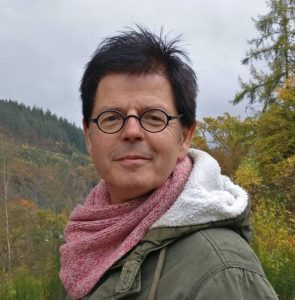As part of a series of international collaborative courses offered by the Social Sciences and Humanities Unit for the Kyoto University Top Global Course (AGST), the Division of Natural Resource Economics will hold an intensive lecture course entitled “The Making and Implementing of European Union Policies in the Field of Sustainable Development” (Special Lecture on Natural Resources Economics VA) , taught by Dr. Eric Ponthieu, Head of the Unit “Agriculture, Rural Development and the
Environment”, European Economic and Social Committee (EESC) on July 26, 28 and August 1, 2, 2022.
[Course Title]
[Intensive, First semester]
Special Lecture on Natural Resources Economics VA (生物資源経済学特別講義VA)(Code: FC08000)
“The Making and Implementing of European Union Policies in the Field of Sustainable Development”
[Number of credits]
1 (one)
[Instructor]
Dr. Eric Ponthieu
Head of the Unit “Agriculture, Rural Development and the
Environment”, European Economic and Social Committee (EESC)
[Schedule]
July 26 (Tue.): 8:45-10: 15 (Lecture 1) & 10:30-12:00 (Lecture 2)
July 28 (Thu.): 8:45-10: 15 (Lecture 3) & 10:30-12:00 (Lecture 4)
August 1 (Mon.): 8:45-10: 15 (Lecture 5) & 10:30-12:00 (Lecture 6)
August 2 (Tue.): 8:45-10: 15 (Lecture 7) & 10:30-12:00 (Lecture 8)
[Course Format]
In person
[Venue]
Room E217, 2nd Floor, Faculty/Graduate School of Agriculture Main Bldg.
Click here for a map of the venue.
[Language]
English
[Overview and purpose of the course]
The lecture will assess how the EU is applying the principles and is aiming at the targets of the 2030 UN Sustainable Development Agenda. It will highlight a certain number of key policy developments such as the European Green Deal, the Farm to Fork strategy, the EU Circular Economy Action Plan and the structural involvement of civil society and youth in decision-making processes.
National decision-making has often been characterized by its narrow vertical, sectoral policy approach and its almost total absence of considerations for the global environment. A wind of change however blows on the governance of states, forcing them to adapt to new challenges and opportunities. Today, it is commonly admitted that all significant decisions by governments, but also by private and public organisations, should be taken through the lens of the sustainability criterion. Practically, it means that each new project, policy or financing has to be assessed on whether it can lead simultaneously to a prosperous economy, an inclusive society and a protected ecosystem. Another system change concerns the growing interdependence of states and the obligation to take stock of global issues when designing the content of national decisions; the pressing question of climate change is the perfect illustration of the need for aligning national policies towards the common goal of mitigating temperature rise increase.
The paradigm change in the way to take decisions at state, public and private organisations’ level requires to adapt academic programs to the new reality of integrated and comprehensive decision- and policy-making. This lecture will provide students with the vision of how sustainable development (SD) has become the main benchmark of any decision in the different sectors of the society, at all institutional levels. To demonstrate that comprehensive and global decision-making approaches are both right and necessary, the lecture will investigate the specificities of the sustainable development policies of the EU. It will show how the EU succeeded in progressively integrating a wider set of policies to address key sustainability issues.
The most emblematic development of that integrating approach is the so-called European Green Deal which aims at transforming the EU into a climate neutral society by 2050. The European Green Deal is the first EU wide-ranging policy framework aiming purposely at sustainable development through different transformational goals. The environmental objective (no net emissions of greenhouse gases by 2050) of the European Green Deal is complemented by equally important economic (modern, resource-efficient and competitive economy) and social (no person and no place left behind) goals. The lecture will analyse in detail the overall governance of the European Green Deal and will assess some of its main components such as:
• the Farm to Fork strategy,
• the EU Circular Economy Action Plan
• the structural involvement of civil society and youth in decision-making processes.
The lecture will be a valuable source of inspiration for students who are concerned about the application of ambitious climate policy measures in Japan and other Asian countries.
[Syllabus & Flyer]
Please see Syllabus and Flyer for further information.
[Registration]
[For Academic Credit]:
■Students at GSA (Graduate School of Agriculture):
Please register on KULASIS according to the following schedule:
・April 2- 18: Timetable creation
・April 19- 20: Registration
・April 23- 26 : Correction
・April 28 (5:00 pm): Confirmation of registration
■Students at other Graduate Schools:
Students at other Graduate Schools also can register for this course. However, the course registration process may differ from one Graduate School to another. For details, please contact the student affairs office of your affiliated Graduate School.
[For Auditing (Non-credit Participation)]:
Please register with Assistant Teaching Staff Mr. Makoto Kuroda by contacting him at:
kuroda.makoto.6a[at]kyoto-u.ac.jp (please replace [at] with @)
by July 15, 2022.
[Contact]
Makoto KURODA, Assistant Teaching Staff, Division of Natural Resource Economics, Graduate School of Agriculture
E-mail: kuroda.makoto.6a[at]kyoto-u.ac.jp (please replace [at] with @)
Extension: 6187



